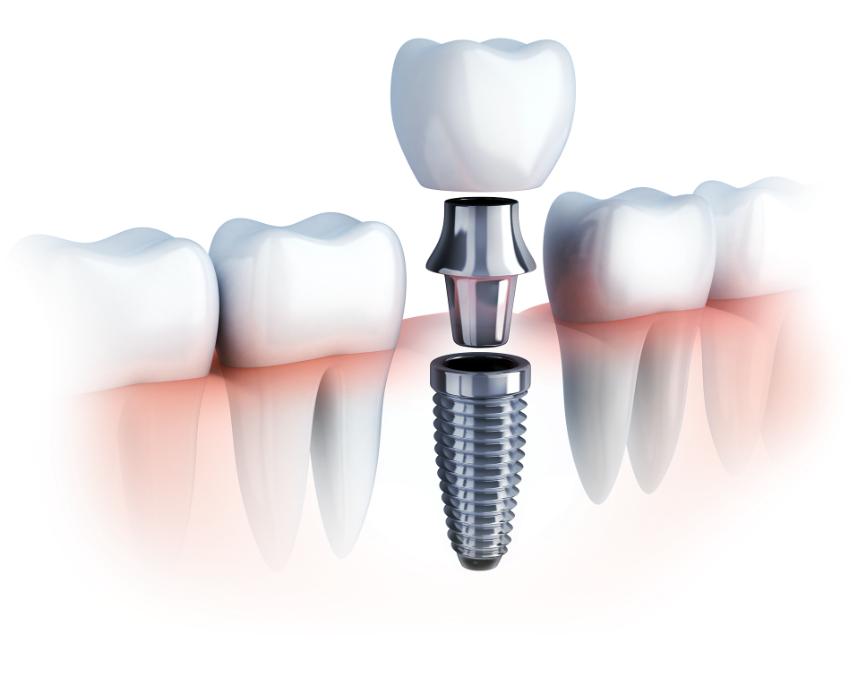Dental Sense - An Overview
Dental Sense - An Overview
Blog Article
All About Dental Sense
Table of ContentsNot known Incorrect Statements About Dental Sense See This Report on Dental SenseDental Sense Things To Know Before You BuyDental Sense Can Be Fun For Everyone
are medical devices surgically implanted into the jaw to restore a person's ability to chew or their look. They offer support for fabricated (fake) teeth, such as crowns, bridges, or dentures. When a tooth is shed due to injury or illness, an individual can experience complications such as rapid bone loss, malfunctioning speech, or adjustments to eating patterns that lead to pain.Oral implant systems are composed of an oral implant body and oral implant abutment and might likewise consist of a joint fixation screw. Root canal procedure. The dental implant body is surgically put in the jawbone instead of the tooth's root. The oral implant joint is typically connected to the dental implant body by the abutment fixation screw and prolongs through gums into the mouth to support the affixed fabricated teeth
(https://filesharingtalk.com/members/608667-dentalsense1)Structure of The Oral Implant System selecting dental implants, speak with your oral company about the prospective benefits and dangers, and whether you are a prospect for the procedure. Things to take into consideration: Your overall health and wellness is a vital aspect in figuring out whether you are an excellent prospect for oral implants, for how long it will take to heal, and the length of time the dental implant might stay in area.
Smoking might impact the healing process and decrease the long-lasting success of the implant. The healing procedure for the dental implant body might take several months or longer, throughout which time you commonly have a temporary abutment instead of the tooth. the dental implant treatment: Very carefully comply with the dental hygiene instructions offered to you by your dental company.
Everything about Dental Sense
Implant failure can lead to the requirement for one more surgical procedure to repair or change the dental implant system. Recovers the ability to chew Brings back cosmetic look Assists keep the jawbone from diminishing because of bone loss Preserves the health of the surrounding bone and gum tissues Aids keep adjacent (nearby) teeth secure Enhances high quality of life Damage to bordering natural teeth during implant positioning Injury to the surrounding tissues throughout surgery, such as sinus opening Injury during surgical treatment (for instance, crack of surrounding jawbone) Poor function, such as really feeling like the teeth do not bite with each other typically A feeling that the tooth hangs or turning in location resulting from an abutment screw loosening up Implant body failing (looseness of the implant body) because of systemic infection, which may be most likely in clients with unchecked diabetes as a result of local infection in bone and gum tissues supporting the dental implant body due to postponed healing, which might be much more likely in people who smoke Problem cleansing the gum tissues around the dental implant, resulting in poor dental health Neglected gum illness Post-surgical pins and needles due to nerve impingement or damage Constantly alert wellness care carriers and imaging technicians that you have oral implants before any magnetic vibration imaging (MRI) or x-ray treatments.
FDA is not knowledgeable about any kind of negative occasions reported for MRI or x-ray treatments with oral implants. Dental implants systems are normally constructed from materials that adhere to worldwide agreement criteria of the International Organization for Standardization (ISO) or ASTM International. These criteria have details of what makes a risk-free material.

An oral implant is a framework that replaces a missing out on tooth. With screw-like devices, the cosmetic surgeon inserts a dental implant right into the jawbone, and it acts as an anchor for an artificial tooth, called a crown. A device called a joint connects the fabricated tooth to the dental implant. The crown is tailor-made to fit the individual's mouth and match the shade of their teeth.
Dental Sense - Truths
Some individuals are not eligible for dental implant surgical procedure. It is for oral surgeons to operate individuals with: intense illnessuncontrollable metabolic diseasebone or soft tissue disease or infectionIf these problems are resolved, a person can have the surgical procedure. In, oral cosmetic surgeons abstain from running on individuals with: If individuals with any of the above go through oral implant surgical treatment, there is a higher risk of the implant stopping working.

Dental implant surgery is a tailored procedure. Give you time to recover. Attach the message and last crown, bridge or denture.
Next, your doctor will meticulously place the oral implant right into your jaw. Finally, your cosmetic surgeon will certainly reposition your gum tissues and close the incision with stitches. If your dental implant is near the front of your mouth, your dental practitioner will make a short-lived tooth for you to use till you recover. That method, you won't have a space in your smile while you recuperate.
Little Known Questions About Dental Sense.
During the healing phase, your jawbone should fuse to the oral implant. This procedure can take anywhere straight from the source from three to 9 months.
When your dental implant heals, your dental practitioner can affix the abutment (tiny connector article) and your final repair (crown, bridge or denture). This normally takes regarding one hour to complete and might call for a second small surgery. You shouldn't really feel any type of discomfort throughout your oral implant procedure due to the fact that your provider will certainly use drug to numb your periodontals.
Report this page